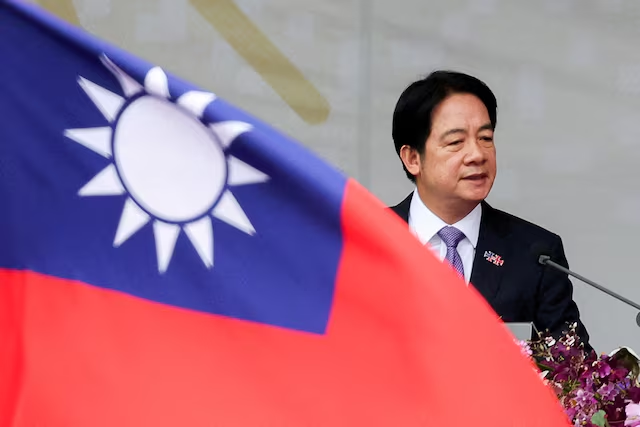Taiwanese President Lai Ching-te has called on China to “unclench its fists” and refrain from unilateral actions, urging Beijing to respect international norms rather than resorting to military intimidation. His remarks came on Friday during the final day of his Pacific tour, amid expectations of fresh Chinese military exercises near Taiwan.
Beijing’s Response to Lai’s US Stopovers
China, which views Taiwan as a breakaway province and claims it as its own territory, has strongly criticized Lai’s recent travels. His itinerary included stopovers in Hawaii and Guam, both U.S. territories. According to security sources, China is preparing for another round of military drills in response to Lai’s tour, which Beijing sees as provocative.
Speaking from Palau, a Pacific Island nation, Lai expressed hopes for China to adhere to a rules-based international order and to seek respect through cooperation rather than coercion. “It’s better to open your hands than to clench your fists. Only by doing so can China win respect from the international community,” Lai stated, addressing reporters during a live broadcast on Taiwanese television.
Condemnation of Chinese Military Intimidation
Lai criticized China’s reliance on military drills to assert its claims, calling such actions “unsettling and regrettable.” He added, “No matter how many military drills China stages or how many ships and aircraft they dispatch to intimidate regional countries, China will not win respect from any country.” He urged Beijing to stop using Taiwan’s international engagements as an excuse for provocations.
Taiwan has remained vigilant amid the rising tensions, Lai assured, emphasizing the island’s preparedness. “Our government has a full grasp of the regional security situation and has made the best preparations to ensure the security of the Taiwan Strait,” he said.
China’s Position on Taiwan
China’s foreign ministry reiterated its hardline stance on Taiwan, labeling it as the “core of China’s core interests.” Foreign ministry spokesperson Lin Jian warned that the Taiwan issue represents a “red line” in Sino-U.S. relations and reaffirmed Beijing’s determination to defend its sovereignty and territorial integrity.
Beijing has repeatedly dismissed Lai’s offers for dialogue, branding him a “separatist” and rejecting Taiwan’s right to engage with the international community. Lai, however, maintains that Taiwan’s future can only be decided by its people and asserts the island’s right to foster international relations.
The Importance of Peace and Strengthened Defenses
While advocating for dialogue, Lai has acknowledged the realities of Taiwan’s security challenges, stating that peace cannot be taken for granted. “We cannot have any illusions about peace,” Lai said. “Taiwan must continue to strengthen its defenses.” Reiterating his commitment to peace, he emphasized, “Peace is priceless, and there are no winners in a war.” His comments echoed sentiments shared earlier in Hawaii after visiting the Pearl Harbor Memorial, a solemn reminder of the consequences of conflict.
China’s Growing Military Drills
China has conducted two significant rounds of war games around Taiwan in 2024, with the first occurring in May shortly after Lai’s inauguration and the second in October following his national day address. These exercises, involving naval and aerial maneuvers, aim to signal Beijing’s displeasure over Taiwan’s activities and engagements with the international community.
Strengthening US-Taiwan Ties Amid Political Transition
Lai’s stopover in Guam included meetings with U.S. congressional leaders, including House Speaker Mike Johnson. He expressed optimism about Taiwan’s relationship with the United States, despite uncertainties surrounding the incoming U.S. administration. Former President Donald Trump, who is set to return to the White House in January, has taken controversial stances on Taiwan, suggesting the island should pay for U.S. defense support and accusing Taiwan of monopolizing the U.S. semiconductor industry.
Nonetheless, Lai highlighted Taiwan’s bipartisan support in Washington, expressing confidence in continued collaboration. “Taiwan is optimistic that we can deepen cooperation with the new U.S. government and jointly resist the expansion of authoritarianism,” he said.
Looking Ahead
As China prepares for another round of military drills, tensions in the Taiwan Strait show no signs of abating. Lai’s steadfast stance against Beijing’s aggression and his emphasis on diplomacy and defense reflect Taiwan’s determination to navigate these challenges while securing its place on the global stage.



